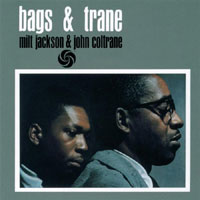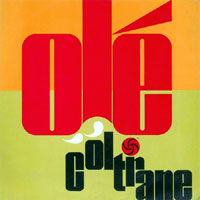John Coltrane and Milt Jackson • Bags & Trane
John Coltrane • Olé Coltrane
ow would we think of John Coltrane today if his recorded output consisted of only the great albums he made for Prestige -- Coltrane, Soultrane and Setting the Pace? Probably in the same way we'd consider Bob Dylan if he only produced his self-titled debut, The Freewheelin' Bob Dylan and The Times They Are A-Changin': as a master of the music during a certain point in its development, not as the true explorer he was. Coltrane left Prestige in the late 1950s for Atlantic, where he recorded these two albums, one at the beginning of his tenure there and the other at the end, one displaying a facet of his playing, the other his restless creative heart. They and the other Atlantic albums were vital to broadening his oeuvre and cementing his place in jazz history. Bags & Trane, recorded in 1959, was Coltrane's first record for his new label. "Bags" is of course Milt Jackson, founding member of the Modern Jazz Quartet and, along with Lionel Hampton, most responsible for the vibes becoming a mainstream jazz instrument. I think of this album in much the same way I do Coltrane's collaboration with Johnny Hartman: consummate music-making, the most muscular of tenor saxophonists subduing his fiery nature in order for the more languid and lyrical tendencies of his partner to carry the set. Connie Kay on drums, Hank Jones on piano, and Paul Chambers on bass turn in consummate sidemen performances, none overshadowing the two headliners. In many ways, this sounds like a Modern Jazz Quartet album, Jackson's cerebral runs floating above Coltrane's rich tonality, a fine balance of lightness and density. Although Olé Coltrane was recorded in 1961, a scant two years after Bags & Trane, there were four albums in between, including the aptly named Giant Steps. Olé Coltrane has a completely different sound, no doubt due to an expanded lineup that includes Freddie Hubbard on trumpet and Eric Dolphy on flute -- big personalities. A testament to Coltrane's ever-probing nature, the 18-minute title cut is more meditation than progression. It is spread across the first two sides here, and some listeners will appreciate the break. Coltrane turns in some amazing solos on the set's other two cuts, the hard-boppish "Dahomey Dance" and the lyrical "Aisha," written with McCoy Tyner. Both of these 45rpm sets were mastered at Bernie Grundman Mastering and pressed at Pallas. As both jackets proudly proclaim, "Transfer from master tapes to master lacquers is made on [an] Ampex 300 Tape Recorder, Scully Variable Pitch Lathe and Grampion Feedback cutterhead." To a great extent, the differences in the music make for the differences in the sound, with Bags & Trane being more about microdynamics and touch and Olé Coltrane being about space and texture. Hearing deeply into both sets is easy. I have a 1970s reissue of Bags & Trane, and it sounds less spatially resolved, less deeply detailed and more demure than this reissue, though just as spread apart spatially, as was the custom with early stereo recordings. ORG Music has one of the most eclectic catalogues among
the reissue labels, not strictly adhering to one label or even one style of music. In
addition to these titles, ORG Music has reissued others from the Coltrane Atlantic
catalogue, including My Favorite Things and Jazz, along with a pair from
Ornette Coleman. These add to reissues from Carole King, Sly and the Family Stone, Charles
Mingus, the Replacements, Nirvana, and ex-Minutemen bassist Mike Watt, among others -- a
group of musical dots that don't easily connect, but serious, sink-your-teeth-into-it
music to be sure. |


